The management of sarcoma presents several challenges because of its rarity and diverse subtypes, making accurate diagnosis and specialized treatment crucial. A multidisciplinary approach involving various experts from different cancer specialties is the optimal strategy to improve survival and reduce recurrence rates. Limited awareness and expertise in sarcoma among health-care professionals may lead to delayed or suboptimal management, emphasizing the importance of specialized sarcoma centers, particularly in low- and middle-income countries.
Research efforts are ongoing to develop targeted therapies and improve treatment outcomes, but more research and clinical trials are needed given the rarity and heterogeneity of sarcomas. This year, the European Society for Medical Oncology (ESMO) organized the inaugural ESMO Sarcoma and Rare Cancers Congress, which took place from March 20 to 22, 2023, in Lugano, Switzerland. This highly specialized meeting integrated the content of the former ESMO Sarcoma and GIST Symposium and the updated ESO-ESMO-RCE (European School of Oncology–ESMO–Rare Cancers Europe) Clinical Day on Sarcomas and Rare Adult Solid Cancers, bringing together esteemed international experts and the brightest minds working in these areas of cancer research. This event provided a unique opportunity for the international rare cancer community to foster new collaborations and engage in discussions on challenging cases with renowned experts in this field, including Jean-Yves Blay, MD, PhD; Judith Bovée, MD, PhD; and Robin L. Jones, PhD; among others.
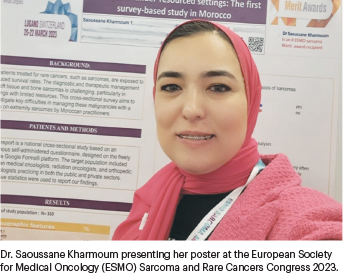
Meeting Highlights
This event provided insights into the diagnosis, prognosis, management, and research outputs of rare adult solid cancers. Specifically, after the inaugural session, the morning was devoted to an overview of the molecular classification, biology, diagnosis, and management of ultra-rare sarcomas, as well as rare cancers of the gynecologic and genitourinary tracts, along with other rare skin cancers. The afternoon was dedicated to sessions discussing advances and challenges in the surgical management of sarcomas (including extremely rare types of thoracic and head/neck cancers).
Additionally, topics included the management of neuroendocrine tumors and how artificial intelligence (AI) may be integrated into this field of rare cancers. AI holds great promise in managing rare cancers by providing performant algorithms to analyze medical images to aid in the early detection and accurate diagnosis of rare cancers. Furthermore, AI can scrutinize genomic and molecular data to identify specific biomarkers and potential therapeutic targets, and this may assist clinicians in tailoring treatment approaches and selecting the most effective therapies for patients.
Focus on Young Oncologists
On the second day of the congress, educational and scientific sessions covered state-of-the-art multidisciplinary care for patients affected by rare solid tumors, as defined by the European Reference Networks. In addition, precision therapies for rare cancers and specific rare molecular subgroups of common cancers were addressed. This meeting dedicated several sessions to discussing methodologic, policy, and advocacy issues focused on rare cancers. A Young Oncologist session provided young oncologists from around the world with an opportunity to exchange ideas, share experiences, and discuss the challenges they face in treating rare sarcomas and cancers within their respective settings. The aim was to foster collaborations and develop perspective solutions.
Moreover, the congress served as a remarkable platform for young oncologists to present their original scientific research advancements through oral and poster communications. (See the photo of Dr. Saoussane Kharmoum presenting her poster after receiving a merit travel grant from ESMO to attend the conference.) Indeed, four oral communications were presented, followed by discussions led by experts in the field. The presentations focused on the tumor of the sex cord of the ovaries, adenocarcinoma of the appendix, and neuroendocrine tumors.
A poster session was also scheduled where each author presented his or her study findings to the ESMO committee and the participants. This session generated a lot of discussion and exchange between presenters and attendees. It is worth noting that some presenters received ESMO merit grants to cover their accommodation and travel expenses, enabling young oncologists from around the world to attend and showcase their research work.
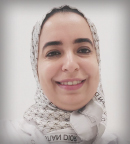
Jinane Kharmoum, MD
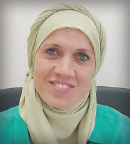
Mariame Chraibi, MD
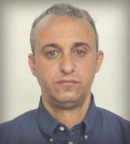
Mohammed Shimi, MD
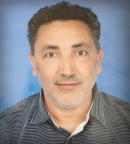
Hassan Errihani, MD, PhD
Survey-Based Sarcoma Study Findings From Morocco
Our communicated abstract summarized a cross-sectional survey-based study conducted in Morocco. The study aimed to investigate the challenges faced by Moroccan practitioners in managing extremity sarcomas. We surveyed 153 medical oncologists, radiation oncologists, and orthopedic traumatologists and found that oncologists often received sarcoma cases without prior biopsy or imaging assessment. Additionally, a significant proportion of surgeons lacked specialization in surgical oncology. Limited access to imaging and specialized pathology services was observed, and participation in sarcoma multidisciplinary meetings was low. The majority of practitioners reported difficulties in determining the best therapeutic options for patients. Furthermore, high-dose methotrexate-based protocols were not used in adult cancer centers, and there were challenges in accessing rehabilitation, physiotherapy, and psychotherapeutic management services. Our study highlights the challenges Morocco faces in accurately diagnosing and treating sarcomas, emphasizing the urgent need for a national reference sarcoma center with expert multidisciplinary teams.
A Valuable Opportunity
The opportunity to attend an ESMO scientific event is highly anticipated by young oncologists from around the globe, especially those practicing in low- and middle-income countries such as Morocco. It provides us with a valuable opportunity to engage in real-time interactions with esteemed experts in the field of sarcoma and benefit from their extensive experience in large-scale clinical trials and real-world evidence.
In our setting in Morocco, the field of sarcoma oncology is not well developed, and we have received insufficient training in managing these rare cancers. Therefore, there is an urgent need for qualified human resources in sarcoma oncology, particularly in resource-limited settings. The involvement of international oncology societies such as ESMO remains one of the best approaches to support health-care professionals and advance their careers in oncology.
Closing Thoughts From Dr. Saoussane Kharmoum
As a passionate young Moroccan medical oncologist dedicated to the management of sarcomas and eager to advance research and enhance patient care in my country, this event presented a golden opportunity for me. It allowed me to explore groundbreaking data with the potential to transform practices in this field, such as precision medicine. Furthermore, I gained new insights into the biology, molecular classification, and diagnosis of sarcomas and rare cancers. The event facilitated the exchange of promising ideas with like-minded oncologists who share similar concerns. Additionally, I had the chance to present my own research on the challenges faced in the management of sarcomas in Morocco, thereby amplifying the voices of my patients on an international stage.
Dr. Saoussane Kharmoum is a medical oncologist at Regional Hospital Center, Tangier, Morocco. Dr. Jinane Kharmoum is Assistant Professor, Laboratory of Pathology, Mohammed VI University Hospital, Faculty of Medicine and Pharmacy, Tangier, Abdelmalek Essaâdi University, Tétouan. Dr. Chraibi is Professor and Head of the Laboratory of Pathology, Mohammed VI University Hospital, Faculty of Medicine and Pharmacy, Tangier, Abdelmalek Essaâdi University, Tétouan. Dr. Shimi is Professor and Head of the Department of Trauma and Orthopaedics, Mohammed VI University Hospital, Faculty of Medicine and Pharmacy, Tangier, Abdelmalek Essaâdi University, Tétouan. Dr. Errihani is Professor and Head of the Department of Medical Oncology, National Institute of Oncology, Faculty of Medicine and Pharmacy, Mohammed V University, Rabat, Morocco.
DISCLOSURE: Dr. Saoussane Kharmoum has participated in a speakers bureau for MSD Oncology and Roche; and has been reimbursed for travel expenses by AstraZeneca and Merck. Dr. Jinane Kharmoum, Dr. Chraibi, and Dr. Shimi reported no conflicts of interest. Dr. Errihani has served as a consultant or advisor for MSD; has participated in a speakers bureau for Novartis, and AstraZeneca; and has received research funding from Roche.
SUGGESTED READINGS
1. Kharmoum S, Najdi A, Kharmoum J, et al: 91P Management challenges of extremity sarcomas in under-resourced settings: The first survey-based study in Morocco. ESMO Open 8(suppl 3):101128, 2023.
2. Kharmoum J, Serhrouchni KI, Eliahai I, et al: Exploring real-world practices and challenges of sarcoma diagnosis in Morocco: A survey-based study among 144 pathologists. Acta Biomed 94:e2023006, 2023.
3. ESMO Daily Reporter: Access to high-quality care for sarcomas is still unequal worldwide. March 20, 2023. Available at https://dailyreporter.esmo.org/esmo-sarcoma-and-rare-cancers-congress-2023/esmo-sarcoma-and-rare-cancers-congress-2023/access-to-high-quality-care-for-sarcomas-is-still-unequal-worldwide. Accessed August 28, 2023.

